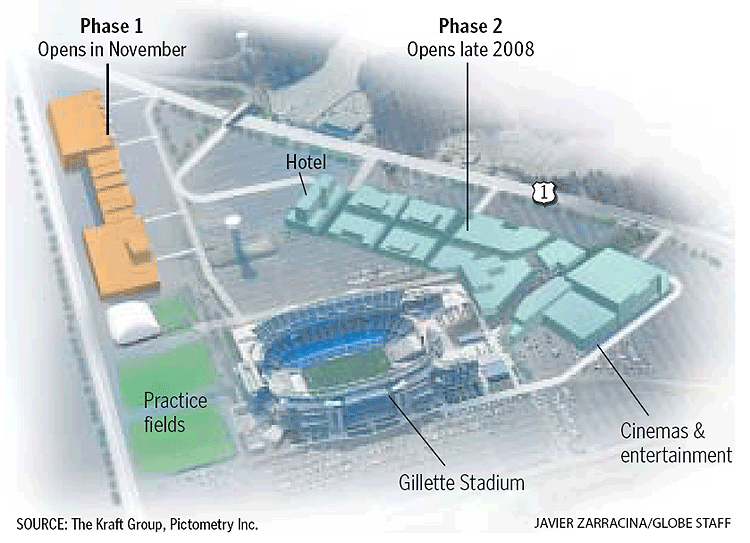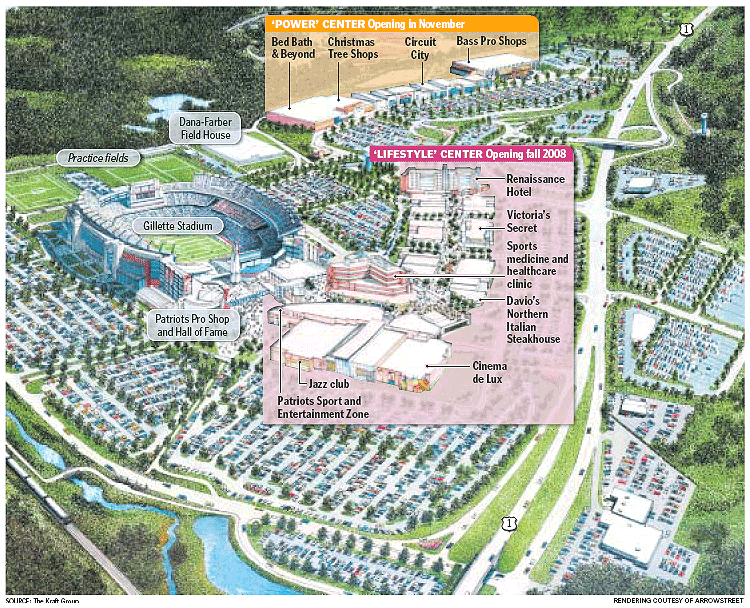Krafts building a $350m Patriot Place complex, and a legacy
By Jenn Abelson, Globe Staff | May 20, 2007
FOXBOROUGH -- New England Patriots owners Robert and Jonathan Kraft typically spend the off season acquiring players and negotiating contracts. But this year they are also thinking about something else: Christmas Tree Shops and Victoria's Secret.
The stores are among the first to sign up for the family's $350 million retail and entertainment complex they are building on much of the 700 acres they own around Gillette stadium .
The project, known as Patriot Place, has 1.3 million square feet, anchored by powerhouse merchants such as outdoor retailer Bass Pro Shops. Other major attractions include a Patriots museum, a sports medicine and healthcare clinic, a 500-seat jazz club, and a high-end movie theater with reserved seating and concierge service. The first phase is set to open this fall as the football season and holiday shopping season are in full swing.
"For me, this is a legacy project," said Robert Kraft , the 65-year-old chairman and chief executive of The Kraft Group and the New England Patriots, during an interview at Gillette Stadium.
"This is where I come to work every day. We want to build something special," he said, speaking for the first time about his vision and motivation for the project.
Certainly, the Krafts' footprint is already huge: They spent $172 million in 1994 taking a big gamble on a mediocre team and then turning the Patriots into three-time Super Bowl champions over the past six years with a new, privately financed $325 million sta dium. The Patriots have sold out every game since the Krafts took ownership, and Forbes magazine last year rated the franchise as the second most valuable in the league at $1.2 billion.
Now the Krafts are making a new bet with Patriot Place, investing $250 million into the complex. The project is a carefully orchestrated enterprise, with the Krafts insisting that all the major players involved -- from the architects to the construction firm-- be local companies. Unlike some mall developers, the family is not eyeing quick profits by selling the project once it is completed. Kraft and his son Jonathan, who say they don't even like to shop, plan to own the development long-term and keep control of the day-to-day operations of the complex, which analysts say is rare for such a large undertaking.
When the Krafts began planning for Patriot Place several years ago, they were alone in developing a project of such size and breadth. But now others are proposing or creating large retail and entertainment centers in Dedham, Westwood, and other nearby towns, making it an increasingly competitive market, said Andy LaGrega , of the Wilder Cos., a Boston development firm that owns and leases shopping centers throughout New England.
"There are some challenges," LaGrega said. "But the Kraft family is a group of very, very smart people. They know what they know, and they know what they don't know. And so they've brought in some top professionals to help in developing this complex."
These include Arrowstreet, a Cambridge architecture firm, and Strategic Retail Advisors, a Framingham retail real estate broker.
About five years ago, after most of the kinks were worked out of their new stadium, the Krafts started seriously considering what to do with their vast land and capacity for more than 20,000 parking spaces that are only filled during football games and stadium events . Several big-box retailers approached the family about building on property across Route 1, but as the Krafts began polling real estate contacts across the country, one idea kept coming up: create an open-air "lifestyle" center that offers a mix of shops and entertainment, is pedestrian-friendly, and can draw visitors from Boston, Providence, and beyond. Bass Pro Shops, which sell fishing and hunting gear, draw consumers on average from a 300-mile radius.
The Krafts are also hoping to capitalize on the recognition they have with the Patriots and attract at least 40,000 visitors daily to the complex after it is completed. On game days, the family hopes to get people to come earlier, stay longer, and to lure into its stores the thousands who show up without game tickets and tailgate in the parking lot all day.
Retail development is a whole new business for the Kraft family. Robert Kraft married into one of Worcester's leading families and then went to work for his father-in-law's packing business, Rand-Whitney Corp. He later started International Forest Products Inc., which trades raw materials and paper products, and together turned these firms into one of the country's largest privately owned paper and packaging companies. All four of Kraft's sons are involved in the Kraft Group, which oversees these businesses, along with Patriot Place, the Patriots, and other ventures.
But despite the Krafts' wealth and high-profile image, breaking into the retail world wasn't easy. Robert Kraft said there was a "bit of clubbiness in the industry" and when they began approaching tenants: "I don't think people thought we were for real."
But the Krafts kept at it, paying tens of millions of dollars in incentives to get coveted merchants, such as Bass Pro Shops, to come to their site. While these merchants still pay rent, it's a common tactic in the retail world to offer handouts to attract popular shops.
The scope of the project and all the moving parts have made this a more difficult and lengthy process than initially expected. Patriot Place will have about 80 stores and restaurants, including the popular Italian restaurant Davio's.
About 60 percent of the complex will be leased, and the Krafts say they now have their pick of merchants and can be very selective.
The first four stores, including Bass Pro Shops and Christmas Tree Shops, will open in November as part of the project's initial phase.
The cinemas, museum, medical facility, and additional retail stores will open in fall 2008.
"You have 12 or 13 new guys each year that end up on a roster. Patriot Place is like filling up an entire football team from scratch on day one," said Jonathan Kraft , 43, president and chief operating officer of the Kraft Group and president of the New England Patriots. "It's tough."
The Krafts are also hoping over the next decade to attract a corporate headquarters and potentially build housing on the site for what they hope will become a revitalized community.
About 15 miles away in Westwood, one of Kraft's competitors, mall developer and former business partner Stephen Karp is planning a massive shopping and residential complex with 1.25 million square feet of retail space, with phase one scheduled to open late next year.
In 1989, Karp and Kraft together purchased the old Patriots stadium in Foxborough in bankruptcy court. At the time, the partners looked at retail potential for the land, but Karp was busy building Emerald Square in Attleboro and the Foxborough region wasn't nearly as developed as it is now. But the relationship reportedly grew tense and ended a few years later when Kraft bought out Karp's share.
Karp declined to comment on Patriot Place, or his relationship with Kraft. But Karp said the Westwood Station project he is co developing is the biggest one of its size in New England, totaling more than 4 million square feet with retail space , residences, offices, and hotels.
But in Foxborough, Town Manager Andrew Gala said the area has long awaited development such as Patriot Place. It's been more than seven years since the town gave permission to the Krafts to build the stadium as part of a newly zoned area designed to encourage commercial development and the state provided $70 million to improve utilities and roads around the area.
Patriot Place is expected to generate up to $2 million annually in new taxes when fully built -- which is almost half of the $4.3 million in commercial taxes currently collected in Foxborough. The Krafts have also agreed to traffic improvements, payments for public safety needs, and the option for the town to connect with the on site sewer system and plant.
"The project means a lot for the community to finally see some commercial development along Route 1," Gala said.
The Krafts say the emphasis on using Bay State businesses, including architecture firm Arrowstreet, for this project is part of the statement they want Patriot Place to make about their commitment to Massachusetts in the wake of takeovers of the region's signature companies by out-of-state firms that have subsequently cut jobs here. These include the stadium's namesake, Gillette, the Boston shaving firm bought in 2005 by Cincinnati consumer giant Procter & Gamble Co., which has since eliminated at least 3,000 positions as part of the deal, with more than half coming from Gillette.
Robert Kraft, a Brookline native whose nine grandchildren all live in Massachusetts, hopes his investment will motivate other firms to commit to the region.
Said Kraft: "We're betting on the future of New England."
Jenn Abelson can be reached at
abelson@globe.com.


